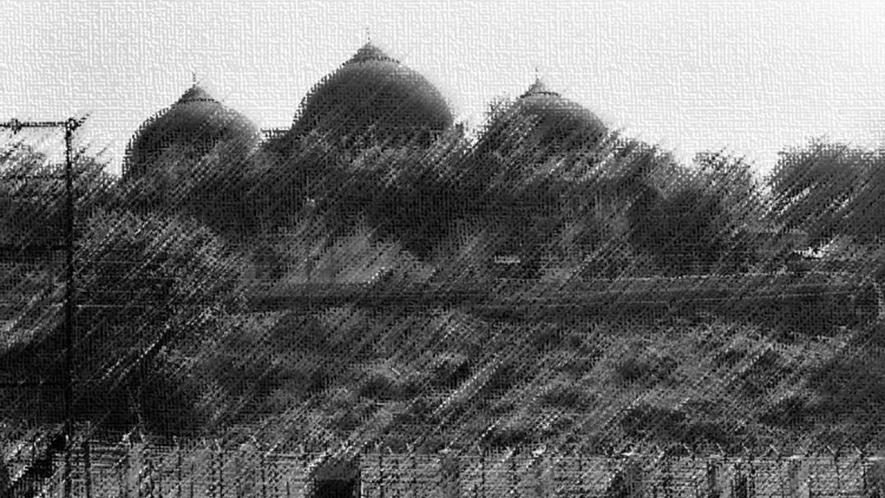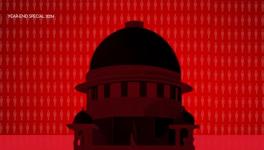How Muslims Perceive Ayodhya Verdict

New Delhi: The Supreme Court verdict on decades-long Ramjanmabhoomi-Babri Masjid land dispute in Ayodhya has received mixed reactions from the Muslim community, with majority of them feeling that they were “denied justice” and they have no choice but to accept the decision. There is also a sense of relief among them that the judgment has put an end to the dispute, which had emerged as the biggest fault line between the two communities in India.
With visible anger and trust deficit for their religious leadership—whom they accuse of “surrendering” and getting “compromised” at the behest of the government—a large section of the community, especially youth, are of the view that no review or curative petition should be filed in the top court as the community has a lot of major issues (such as education, unemployment, political representation and atrocities against them) at hand to handle.
“Let’s move on and start focussing on real issues, instead of fighting for mosques and temples. Make yourself educationally, economically, socially and politically empowered so that your voices are heard,” said most of them.
The top court in its verdict, which was pronounced on November 9, awarded the 2.77 acres of the disputed land to Ram Lalla Virajman—the infant deity (Lord Ram) who first became a litigant in 1989—paving the way for the construction of a temple.
Famously known as Babri Masjid, the 16th-century mosque was razed to the ground on December 6, 1992 by a mob of Karsevaks (those who offer services for free to a religious cause), enjoying the support of right-wing groups. Later, the country witnessed the deadliest communal riots, in which thousands—mostly Muslims—were killed.
The majoritarian belief that Lord Ram was born under the central dome of the Babri mosque got a stamp of the top court, but the claim that the first Mughal emperor Babur got the mosque built by demolishing a temple was rejected, as there was no evidence to suggest the same.
A Supreme Court bench comprising Chief Justice of India Ranjan Gogoi, CJI-designate Justice SA Bobde, Justice S Abdul Nazeer, Justice Ashok Bhushan and Justice DY Chandrachud also ordered the central government to allot five acres of alternate land to Muslims to build a mosque.
The court acknowledged that the mosque was desecrated by illegally placing idols on the intervening night of December 22 and 23, 1949, and finally demolished in 1992 in violation of the rule of law. However, the court directed the government to form a trust within three months to lead the construction of the temple.
Meanwhile, the All India Muslim Personal Law Board (AIMPLB)—which was not a litigant in the case, but was providing legal assistance to the Muslim parties, including the UP Central Sunni Waqf Board—has said that it was not satisfied with the judgment and promised to evaluate legal options, including filing a review petition.
“Though we did not get justice, yet the verdict was necessary. A closure of the matter was essential for a greater good of the country, its peace and development. The issue must be put to rest here only. I would urge the Muslim parties not to go for a review petition, as it would serve no purpose. Let’s move on. Let’s talk about employment, sinking economy and other issues related to nation building,” said Kamran Asfar, a young businessman in his early 30s.
But at the same time, he said, the government must ensure that no such claims are made on other contentious sites across the country. “The government should reign in on its fringe elements and leaders who keep making statements aimed at flaring communal tensions. Our generosity and restraints must not be considered our weakness,” he added.
Similar sentiments were expressed by Qamar Ashraf, a journalist working with a leading national daily, who said the verdict is “disheartening”, but the good thing is that the decades-long dispute is over now. “Without going into technicalities, the SC verdict is disheartening. The only good part of the judgment is that the decades-long dispute is over now,” he said, adding that the apex court’s order to allot a plot for a mosque is “unwarranted” since the Muslim parties involved have consistently been stating that a mosque cannot be shifted.
“The community sees it as a judicious bribery of sort. They don’t want to be patronised, I believe. A vast community of Muslims are increasingly made to believe they are second class citizens,” he rued.
Talking about the role of Muslim leadership in the entire episode, he said, “I heard a host of Muslim ‘leaders’ under concerted pressure from right wing too wanted to get rid of it. Further, some stakeholders (Muslims), UP Sunni Central Waqf Board for example, played a dubious role. It’s also a fact that it could not do much as the government holds sway over it. The community too does not pin hope in such bodies. For that matter, the few faces glitter on TV screens too are discredited lot. Most of them have appeared without trace.”
Mohammad Aswad, an engineer who is associated with the real estate industry, said, “Though the community respects the supremacy of the judiciary, the verdict is still an injustice. Our claim was related to the title of the land only. The court accepted most of the arguments forwarded by us, but gave the land to the Hindu parties. We were given a site, which we had not sought at all. Such injustices may lead to an Armageddon.”
However, some consider the judgment to be not so disappointing, given the challenges the apex court has had while resolving the dispute peacefully. “This was a challenging task for the Supreme Court and I think the top court’s judgment is a balanced one. Muslims should not feel disappointed as most of their claims—such as the mosque was not built after demolishing any temple, namaz was offered in the mosque for a long time, it was illegally turned into a temple by placing idols, etc.—have been accepted by the court. We should stick to our principled stand that the Supreme Court is supreme and we will accept its verdict. We should respect the supremacy of the highest court of the country and we are doing that. We are a peace-loving community and not religious fanatics. We have shown this to the world earlier and will continue to do the same this time as well,” said Yawar Rahman, an entrepreneur.
He urged the community, especially its youth, to contribute to economic prosperity for upliftment of the community, the society and the country. “India is a growing economy and we must contribute to it,” he said, asking the Muslims’ religious and political leadership not to take it any further, as it will “lead to further polarisation”.
“The issue must end here. Our religious and political leadership — if any — must realise that if they stretch it, it will further polarise the society. And if the polarisation deepens, they will be held accountable. The case has brought to the fore their character and original face. They must understand that they have lost their relevance,” he added.
Asked about the five-acre land the apex court has ordered the government as an alternate site for mosque construction, he concluded, “Muslims should politely refuse to accept the land, as it was not a fight for a piece of land. We should tell the government very politely that we don’t need any alternate site, as we have no dearth of mosques. It was a title suit, which has been decided. In fact, the land in question should have been gifted to the Hindu parties much earlier in the greater good of the society and to win the hearts of the majority community. It would have been one of the best examples of communal harmony. But the Muslim clergy did not do so. Those who are saying that Muslims should accept the land and construct a hospital or a university should also stop doing politics. If we are so concerned about health and education, we should buy another piece of land for the same instead of using the government land given in charity.”
The contest of Muslim side—said Advocate MR Shamshad, who was representing Iqbal Ansari, a litigant in the case—was exactly for the same reason, as the court has observed: (a) various acts supported by the state/government functionaries, damaged the fundamental values of our system; (b) the legal fight was to ensure the equal right of religious practice of all citizens of the country; (c) it was to maintain fraternity, show and ensure tolerance to the faith religious beliefs of each other; (d) it was not a commercial litigation where restitution, by giving compensatory land will balance the equities of losing party; (e) since it was the issue of fundamental rights and values, compensatory land is irrelevant consideration and the community should consider whether they need five acres of land or not?
“In the last two months, the chairman of UP Sunni Board became unprincipled character in this legal fight, hence he should not take a call on behalf of the community as to whether he should accept this land or not,” he added.
Nadeem Ahmad, a pharmaceutical professional, described the judgment as the “best possible settlement”. “It was not justice, but best possible settlement to avoid any conflict in the society. I think the community should move on and focus on its issues for economic prosperity,” he added.
Babu Bhai, a member of the Babri Mosque Citizen Resolution Committee in Ayodhya, said, “We have no issues with building of a temple, but we would have been happier if the court had specified the place where the mosque would be built.”
Another resident of Ayodhya, who did not want to be identified, said, “Our generations have witnessed so much hostility because of this dispute and if this is how the court feels it should be addressed, we respect it and welcome the verdict. Since we have kept saying that we will accept the verdict at any cost, hence there is no reason to differ.”
Also read: Ayodhya Verdict: Just or Majoritarian?
Get the latest reports & analysis with people's perspective on Protests, movements & deep analytical videos, discussions of the current affairs in your Telegram app. Subscribe to NewsClick's Telegram channel & get Real-Time updates on stories, as they get published on our website.
























